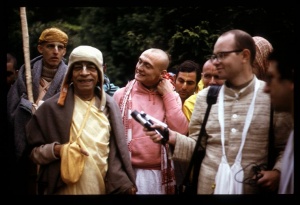SB 10.71.15

A.C. Bhaktivedanta Swami Prabhupada
TEXT 15
nṛ-vāji-kāñcana-śibikābhir acyutaṁ
sahātmajāḥ patim anu su-vratā yayuḥ
varāmbarābharaṇa-vilepana-srajaḥ
su-saṁvṛtā nṛbhir asi-carma-pāṇibhiḥ
SYNONYMS
nṛ—human; vāji—with powerful carriers; kāñcana—golden; śibikābhiḥ—with palanquins; acyutam—Lord Kṛṣṇa; saha-ātmajāḥ—along with their children; patim—their husband; anu—following; su-vratāḥ—His faithful wives; yayuḥ—went; vara—fine; ambara—whose clothes; ābharaṇa—ornaments; vilepana—fragrant oils and ointments; srajaḥ—and garlands; su—well; saṁvṛtāḥ—encompassed; nṛbhiḥ—by soldiers; asi—swords; carma—and shields; pāṇibhiḥ—in whose hands.
TRANSLATION
Lord Acyuta's faithful wives, along with their children, followed the Lord on golden palanquins carried by powerful men. The queens were adorned with fine clothing, ornaments, fragrant oils and flower garlands, and they were surrounded on all sides by soldiers carrying swords and shields in their hands.
PURPORT
According to Śrīdhara Svāmī, the word vāji indicates that some of Lord Kṛṣṇa's queens were transported by horse-drawn conveyances.